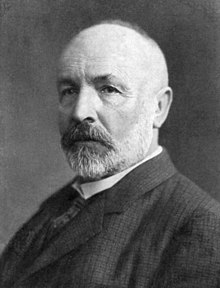
Back Bipolêre gemoedsteuring Afrikaans اضطراب ثنائي القطب Arabic بيپولير ARY ذهان الهوس و الاكتئاب ARZ Trestornu bipolar AST Bipolyar pozuntu Azerbaijani بی پولار پوزولماسی AZB Біпалярны афектыўны разлад Byelorussian Биполярно разстройство Bulgarian দ্বিপ্রান্তিক ব্যাধি Bengali/Bangla

Bipolar disorder (also known as manic depression) is a mental illness where a person will have repeated, long-lasting feelings (episodes) of high (mania) and low mood (depression). It may occur with or without cycles of normal mood, called euthymia. A mixed episode occurs when both mania and depression are present at the same time. People with bipolar disorder experience the whole spectrum of emotional feelings from unimaginable grief to full blown euphoria whereas normal people experience only a section of the spectrum of emotional feelings somewhere between extreme grief and extreme happiness.[3]
- ↑ Dauben 1979, p. 280: "...the tradition made popular by Arthur Moritz Schönflies blamed Kronecker's persistent criticism and Cantor's inability to confirm his continuum hypothesis" for Cantor's recurring bouts of depression.
- ↑ Dauben 2004, p. 1. Text includes a 1964 quote from psychiatrist Karl Pollitt, one of Cantor's examining physicians at Halle Nervenklinik, referring to Cantor's mental illness as "cyclic manic-depression".
- ↑ "Bipolar Disorder". National Institute of Mental Health (NIMH). Retrieved 2023-07-29.